Books
Dig deeper into Netflix’s “The Social Dilemma” with these books on the dangers of Social Media
Published
4 years agoon
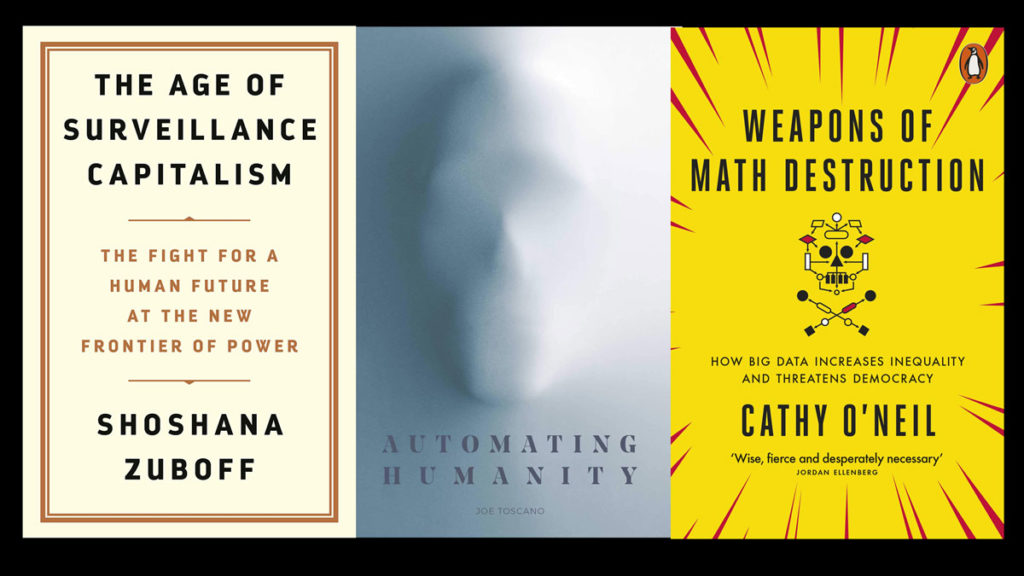
Reprogramming civilization via Social Media….
“The Social Dilemma” a documentary now available to watch on Netflix, exposes some hard truths and dangers of social networking. Former employees from juggernaut tech companies including Facebook, Twitter, Instagram, Pinterest and many others are interviewed, many of whom co-invented and developed the very structures and business models that are creating major problems as broken-down and discussed in the docu-drama.
Read More: Apple’s Ad Spotlights in a Hilarious Tour de Force: Why Privacy Matters on your iPhone
Not much of a spoiler alert, but social media companies not only sell our user data, but in conjunction use all that data to create an ultra-sophisticated psychological profile, ultimately to have the powerful ability to manipulate us. Your privacy, surveillance capitalism, positive intermittent reinforcement, artificial intelligence (AI), algorithms, dopamine hits, are just some of the terms used within the film and very much prevalent in social media.
There are only two industries that call their customers ‘users’: illegal drugs and software”
Edward Tufte
We’ve curated a list of books written by the former tech employees that appeared in the documentary, as well as provided some additional information from the publisher. Click to see more book information, we’ve provided links for purchase that if interested that helps out independent books stores.
Weapons of Math Destruction by Cathy O’Neil
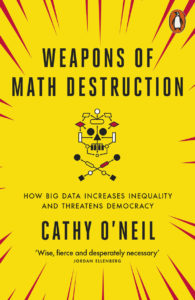
and help Independent Bookstores.
Also Available on Amazon.
We live in the age of the algorithm. Increasingly, the decisions that affect our lives–where we go to school, whether we can get a job or a loan, how much we pay for health insurance–are being made not by humans, but by machines. In theory, this should lead to greater fairness: Everyone is judged according to the same rules.
But as mathematician and data scientist Cathy O’Neil reveals, the mathematical models being used today are unregulated and uncontestable, even when they’re wrong. Most troubling, they reinforce discrimination–propping up the lucky, punishing the downtrodden, and undermining our democracy in the process. Welcome to the dark side of Big Data.
NEW YORK TIMES BESTSELLER – A former Wall Street quant sounds the alarm on Big Data and the mathematical models that threaten to rip apart our social fabric–with a new afterword. “A manual for the twenty-first-century citizen . . . relevant and urgent.”–Financial Times. NATIONAL BOOK AWARD LONGLIST – NAMED ONE OF THE BEST BOOKS OF THE YEAR BY The New York Times Book Review – Boston Globe – Wired – Fortune – Kirkus Reviews – The Guardian – Nature – On Point
Automating Humanity by Joe Toscano

and help Independent Bookstores.
Also Available on Amazon.
Automating Humanity is an insider’s perspective on everything Big Tech doesn’t want the public to know–or think about–from the addictions installed on a global scale to the profits being driven by fake news and disinformation, to the way they’re manipulating the world for profit and using our data to train systems that will automate jobs at an explosive, unprecedented scale.
Toscano provides a critique of modern regulation, including parts of the new European Union’s General Data Proctection Regulation (GDPR) suggesting how we can create proactive, adaptable regulation that satisfies both the needs of consumer safety and commercial success in the international economy. The content touches on everything from technology, economics, and public policy to psychology, history, and ethics, and is written in a way that is accessible to everyone from the average reader to the technical expert. Click Here to See “Automating Humanity” and help Independent Bookstores. Also Available on Amazon.
The Age of Surveillance Capitalism by Shoshana Zuboff
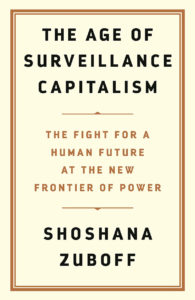
and help Independent Bookstores.
Also Available on Amazon.
In this masterwork of original thinking and research, Shoshana Zuboff provides startling insights into the phenomenon that she has named surveillance capitalism. The stakes could not be higher: a global architecture of behavior modification threatens human nature in the twenty-first century just as industrial capitalism disfigured the natural world in the twentieth.
Zuboff vividly brings to life the consequences as surveillance capitalism advances from Silicon Valley into every economic sector. Vast wealth and power are accumulated in ominous new “behavioral futures markets,” where predictions about our behavior are bought and sold, and the production of goods and services is subordinated to a new “means of behavioral modification.”
The threat has shifted from a totalitarian Big Brother state to a ubiquitous digital architecture: a “Big Other” operating in the interests of surveillance capital. Here is the crucible of an unprecedented form of power marked by extreme concentrations of knowledge and free from democratic oversight. Zuboff’s comprehensive and moving analysis lays bare the threats to twenty-first century society: a controlled “hive” of total connection that seduces with promises of total certainty for maximum profit–at the expense of democracy, freedom, and our human future. Click Here to See “The Age of Surveillance Capitalism” and help Independent Bookstores. Also Available on Amazon.
Ten Arguments for Deleting Your Social Media Accounts Right Now by Jaron Lanier
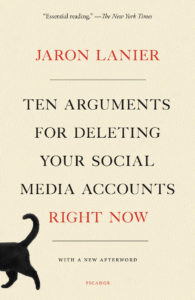
“Ten Argument for Deleting Your Social Media Accounts“
and help Independent Bookstores.
Also Available on Amazon.
You might have trouble imagining life without your social media accounts, but virtual reality pioneer Jaron Lanier insists that we’re better off without them. In Ten Arguments for Deleting Your Social Media Accounts Right Now, Lanier, who participates in no social media, offers powerful and personal reasons for all of us to leave these dangerous online platforms.
Lanier’s reasons for freeing ourselves from social media’s poisonous grip include its tendency to bring out the worst in us, to make politics terrifying, to trick us with illusions of popularity and success, to twist our relationship with the truth, to disconnect us from other people even as we are more “connected” than ever, to rob us of our free will with relentless targeted ads. How can we remain autonomous in a world where we are under continual surveillance and are constantly being prodded by algorithms run by some of the richest corporations in history that have no way of making money other than being paid to manipulate our behavior? How could the benefits of social media possibly outweigh the catastrophic losses to our personal dignity, happiness, and freedom? Lanier remains a tech optimist, so while demonstrating the evil that rules social media business models today, he also envisions a humanistic setting for social networking that can direct us toward a richer and fuller way of living and connecting with our world. Click Here to See “Ten Argument for Deleting Your Social Media Accounts” and help Independent Bookstores. Also Available on Amazon.
The Righteous Mind by Jonathan Haidt
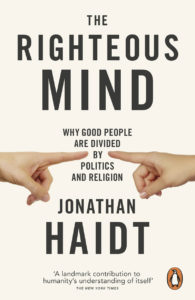
and help Independent Bookstores.
Also Available on Amazon.
Drawing on his twenty five years of groundbreaking research on moral psychology, Haidt shows how moral judgments arise not from reason but from gut feelings. He shows why liberals, conservatives, and libertarians have such different intuitions about right and wrong, and he shows why each side is actually right about many of its central concerns. In this subtle yet accessible book, Haidt gives you the key to understanding the miracle of human cooperation, as well as the curse of our eternal divisions and conflicts. If you’re ready to trade in anger for understanding, read The Righteous Mind.
In this “landmark contribution to humanity’s understanding of itself” (The New York Times Book Review) social psychologist Jonathan Haidt challenges conventional thinking about morality, politics, and religion in a way that speaks to conservatives and liberals alike. Click Here to See “The Righteous Mind” and help Independent Bookstores. Also Available on Amazon.
Subscribe to our YouTube Channel
Subscribe to our newsletter for all the latest updates directly to your inBox.
Find books on The Social Dilemma, Big Tech, Sustainable Energy, Economics and many other topics at our sister site: Cherrybooks on Bookshop.org
Enjoy Lynxotic at Apple News on your iPhone, iPad or Mac.
Lynxotic may receive a small commission based on any purchases made by following links from this page.


